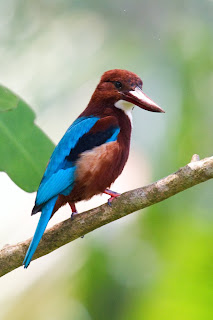A White-throated Kingfisher photographed in Colombo
Amongst all the Kingfishers found in Sri Lanka, the White-throated Kingfisher is probably the most common. It frequents home gardens in urban areas and is often seen perched on telephone lines on the side of the road. More info and images after the jump.
A White-throated Kingfisher photographed in Anuradhapura
The White-throated Kingfisher is also known as the White-breasted Kingfisher or Smyrna Kingfisher. It is a widely distributed Tree Kingfisher which can be found from Bulgaria, east through South Asia up to the Philippines. It is a resident throughout this range but some populations are known to make short migrations. It is a large Kingfisher, measuring up to 28cm in length. It can be found in a variety of habitats, ranging from open country with trees, up to 7500 feet in the Himalayas. The White-throated Kingfisher is not considered to be threatened and its range is expanding.
A White-throated Kingfisher photographed in Colombo
It is often seen perched on wires or other exposed perches within its territory. It usually hunts reptiles, insects, rodents, snakes and fish. Predations of small birds have also been reported. The young are fed mostly on invertebrates.
This species of Kingfisher begins breeding at the onset of monsoons. During the mating displays, males perch on high posts and call in the early hours of the morning. The wings are flicked open for a short period of time to expose the white wing mirrors. They also raise their bills high to expose their white throats and front. The nest is a tunnel in an earth bank and is usually around the 50cm mark in length. The nest building starts with both birds flying into the earth bank until they make an indentation which they can perch on. They then continue digging with their bills. A clutch consists of 4-7 white, round eggs which take 20 days to hatch. The chicks fledge in 19 days.
A White-throated Kingfisher photographed in Colombo
The images taken in Colombo were captured in our garden using a Canon 7D camera with a 100-400mm lens. I also sighted this bird in Trincomalee and Kandy during my last trip to Sri Lanka.




No comments:
Post a Comment